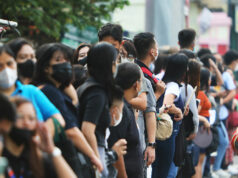WHO to send vaccines after polio resurgence

THE WORLD Health Organization (WHO) will send vaccines against Type 2 polio to the Philippines next month after the government reported at least two polio cases last week.
The Department of Health (DoH) confirmed the polio cases this month after 19 years since the country was declared free of the disease.
The Health department had asked the WHO to release their stock of oral polio vaccines that will prevent Type 2 polio, WHO Country Representative Rabindra R. Abeyasinghe said at a forum hosted by Foreign Correspondents Association of the Philippines.
“The government of the Philippines has now requested the WHO to release vaccines from that stockpile to protect the children,” he said.
The first polio case this month was from Lanao del Sur province in southern Philippines, while the second case was from Laguna province near the capital.
Health Secretary Francisco T. Duque III earlier urged parents and caregivers of children below five years old to take part in the polio vaccination to be scheduled in various communities nationwide.
Type 2 Polio was eradicated in 2015, and vaccines produced since 2016 are only effective in preventing Type 1 and Type 3 polio.
Polio is caused by the poliovirus that infects the brain and spinal cord, causing paralysis or even death. There are no cures for polio but there are vaccines for its prevention.
The vaccines will be shipped to the Philippines within seven to 10 days, Mr. Abeyasinghe said. The Type 2 oral polio vaccine will first be given to Lanao del Sur and Davao, then to the rest of the Mindanao region and Bangsamoro Autonomous Region in Muslim Mindanao for the second and third rounds.
More than having the vaccines, the Philippines must adopt a better strategy to improve the vaccination coverage, Mr. Abeyasinghe told reporters.
For a country to be free from polio, the national vaccination coverage should be 95%. The Philippines had a vaccination coverage of 66% last year.
“If we do the vaccination the way we normally do, you’re seeing another outbreak in another couple of years,” the WHO official said.
Improving hygiene and sanitation also helps because the polio virus thrives in dirty areas and is extremely infectious.
DoH and Rotary International earlier signed a memorandum of agreement to increase polio awareness and strengthen a vaccination campaign against the resurgence of the virus.
The agency said the Rotary’s 10 districts will support the polio vaccination campaign through fund raising, advocacy and volunteer recruitment.
The DoH-Metro Manila Center for Health Development will conduct three rounds of supplemental oral polio immunization for children under five years old.
The Health department said it would intensify monitoring of children below five years who have developed sudden muscle weakness or paralysis of the upper and lower extremities.
Health officials on Tuesday told senators they lack manpower to enforce a nationwide immunization program, after reports that a lower vaccine coverage had led to outbreaks of certain diseases including polio.
During a Senate hearing on Tuesday, Health medical specialist Anthony Calibo said the agency has lacked technical assistance in its immunization programs for the past few years.
He said DoH had proposed to create an immunization unit to address the resurgence of diseases but this was disapproved. — Gillian M. Cortez



